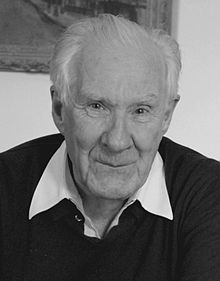
Back Alain Badiou Afrikaans ألان باديو Arabic Ален Бадиу Bulgarian আল্যাঁ বাদিউ Bengali/Bangla Alain Badiou Catalan Alain Badiou Czech Alain Badiou German Αλαίν Μπαντιού Greek Alain Badiou Esperanto Alain Badiou Spanish
Alain Badiou | |
|---|---|
 Alain Badiou, 2012 | |
| Born | 17 January 1937 |
| Education | École Normale Supérieure (B.A., M.A.) |
| Era | Contemporary philosophy |
| Region | Western philosophy |
| School | Continental philosophy Maoism[1] Marxism Modern Platonism[2] |
| Institutions | University of Reims University of Paris VIII École normale supérieure |
Main interests | Set theory, category theory, topos theory, history of philosophy, philosophy of mathematics, metapolitics, metaphysics/ontology, psychoanalysis |
Notable ideas | Event, ontology of the multiple, ontology is mathematics, the One is not, count-as-one, metapolitics |
| Part of a series on |
| Maoism |
|---|
 |
Alain Badiou (/bɑːˈdjuː/;[3] French: [alɛ̃ badju] ⓘ; born 17 January 1937) is a French philosopher, formerly chair of Philosophy at the École normale supérieure (ENS) and founder of the faculty of Philosophy of the Université de Paris VIII with Gilles Deleuze, Michel Foucault and Jean-François Lyotard. Badiou's work is heavily informed by philosophical applications of mathematics, in particular set theory and category theory. Badiou's "Being and Event" project considers the concepts of being, truth, event and the subject defined by a rejection of linguistic relativism seen as typical of postwar French thought. Unlike his peers, Badiou openly believes in the idea of universalism and truth. His work is notable for his widespread applications of various conceptions of indifference. Badiou has been involved in a number of political organisations, and regularly comments on political events. Badiou argues for a return of communism as a political force.[4]
- ^ "Alain Badiou: "Mao thinks in an almost infinite way"". Versobooks.com. Retrieved 19 November 2021.
- ^ Sean Bowden, Badiou and Philosophy, Edinburgh University Press, 2012, p. 63.
- ^ "Radical thinkers: Alain Badiou's Ethics"
- ^ Badiou, Alain; Engelmann, Peter (27 March 2015). Philosophy and the Idea of Communism. Polity Press. ISBN 978-0745688367.